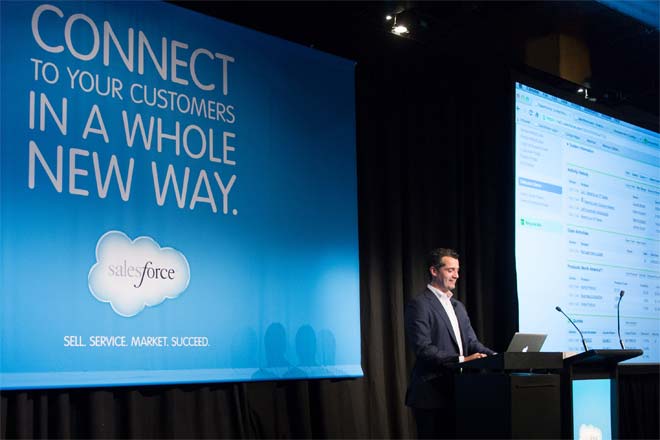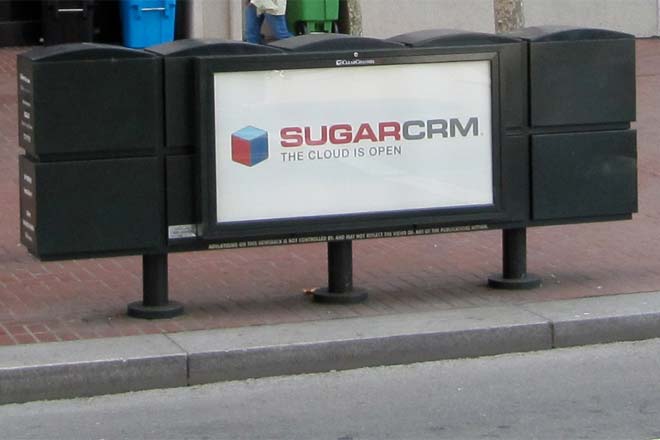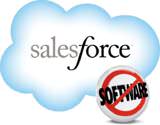Global CRM giant Salesforce.com and its open-source competitor SugarCRM are the leading CRM solutions for businesses of varying sizes.
Salesforce, the largest CRM provider in the industry is an exclusively cloud-based CRM solution, and a very popular choice for mid-size to large enterprises. SugarCRM offers both on-premise as well as cloud versions Its typical clientele has been small businesses, but its extremely customizable, open-source model is gaining increasing popularity.
Comparison chart
With a full line of customer support tools, the ability to access social media, send mass emails and the ability to customize it, many companies feel that Salesforce.com is an excellent solution. On the other hand, SugarCRM is an open-source CRM option that can be either cloud-based (software as a service or SaaS) or can be self-hosted and customized. SugarCRM can also track each step in the sales process and offers a wide range of marketing tools.
Here are some of the basic differences between the two CRM solutions:
Editions and Pricing
Salesforce offers a variety of packages. Salesforce.com editions range from a basic Contact Manager program that only costs $5 per user per month, to an Unlimited program that costs $300 per user per month that includes a full range of CRM options.
SugarCRM editions include Sugar Professional ($35 per user per month), Enterprise ($60) and Ultimate ($150).
SugarCRM Professional vs. Salesforce Professional Edition
Covering sales, marketing, social media, mobile applications and reporting, this video discusses the difference between SugarCRM and Salesforce Professional editions.
Pros and Cons
While both programs offer CRM features that are essential to business, each program also has its own pros and cons. Salesforce offers a larger variety of editions but is more expensive and has a steep learning curve. While SugarCRM is trying to close the feature gap, Salesforce offers more features, including bundled utilities like Chatter which is an enterprise social networking tool that is better suited for large organizations. If users are not deriving a positive benefit from the software or leveraging all its powerful features, then the additional cost of Salesforce could become an unnecessary business expense.
SugarCRM is a good solution for SMBs that are looking for a CRM option without the complexity and cost of Salesforce. In addition, SugarCRM allows each user to have their own database and add applications that they already use and need. But SugarCRM does not have some of the advanced features of Salesforce nor can it match the ecosystem of apps that Salesforce offers and integrates seamlessly with its platform.
Salesforce – Large Company Solution
Salesforce is the perfect cloud-based solution for companies that have been using CRM as a touchstone for communicating with internal teams and conduct campaigns regularly with customers all over the world. The amount of features can be staggering, with options that range from the ability to send a bulk email to having access to a chat tool. This makes it a better choice for larger organizations with well-established sales teams and processes.
Salesforce offers a sales cloud and a service cloud. The sales cloud offers tools such as tracking milestones, communications with customers, automatic email reminders and a communications tool called Chatter. The service cloud is a way for companies to quickly track inquiries and to triage them to the proper people. It also includes a social media option, a chatting tool, search abilities and access to critical customer documents to quickly respond to questions.
SugarCRM – Ideal Small Team Application
SugarCRM offers tools including third-party Google apps support, the ability to track the sales process and way to convert leads from the web to a form. Intuitive and easy to use, this is ideal for smaller companies who don't have large sales teams to coordinate.







 Box
Box  Quicken
Quicken  Accenture
Accenture  Google Drive
Google Drive  Vimeo
Vimeo  Freeware
Freeware
Comments: Salesforce.com vs SugarCRM